

— James Leadbeater, 11, imprisoned and whipped for stealing sticks of celery, 1873 . . .
— Tom Sayers, bare-knuckle fighter — his first big fight, c.1849 . . .
— Report of Christmas Dinner for 200 poor children, 1868 . . .
— Home-School on Trinity Road , 1890 . . .
— Poisoned Lovers on Wandsworth Common, 1907 . . .
— Election excitement, 1910 . . .
— Little Red Riding Hood for the happiness of the poor, 1903 . . .
— The Wombles of Wandsworth Common, 1975 . . .
James Leadbeater, aged 11, photographed in Wandsworth Prison in January 1873:

James Leadbeater was convicted for "Stealing some celery" and given "4 days H.L. [hard labour] & whipped". He already had a record. In August 1872, he had been fined "6 shillings or 7 days in gaol" for "Stealing a quantity of pears, growing" — in short, scrumping. Had he already served time in prison? I assume so, since who could have paid such a large fine for him?
Here are the official records to which his photograph is attached. Notice there is some confusion whether his name should be spelled Leadbeater or Leadbetter (here and in various Censuses).

By chance, I recalled that another Wandsworth Prison inmate photographed in 1873 had the same surname. Jessie Leadbeater's face has haunted me. She was 15, and imprisoned for "stealing 13 bottles". Bottles of what? The contents are not recorded, so they may have been empty.
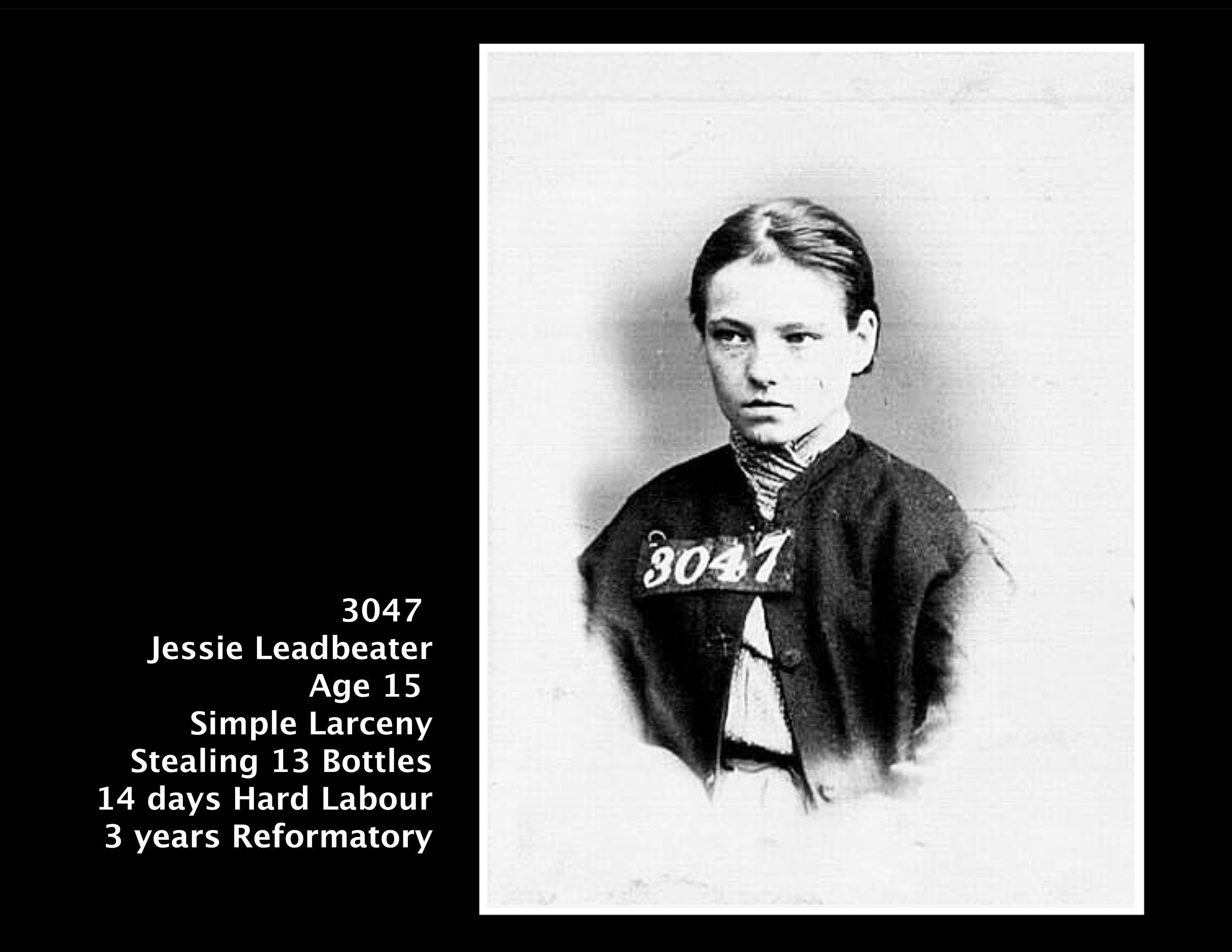
In the first draft of these Chronicles, I had no idea whether Jessie and James were related — she was living in Fulham at the time of her conviction, and James in Battersea. A connection seemed unlikely but since her occupation was given as "servant", this may have been her employer's address. Was she perhaps an older sister?
I was just at the point of sending this month's Chronicles out when I realised I just had to try to find out something about their backgrounds, and whether they could be related.
And indeed they were.

14 Urswick Road, Battersea
Francis Leadbetter, head, 36, 1835, male, Kennington.
Elizabeth Leadbetter, wife, 31, 1840, female, Fulham.
Jessy Leadbetter, daughter, 11, 1860, female, Fulham.
James Leadbetter, son, 10, 1861, male, Fulham.
Henry Leadbetter, son, 8, 1863, male, Fulham.
Emily Leadbetter, daughter, 7, 1864, female, Fulham.
Elizabeth Leadbetter, daughter, 3, 1868, female, Fulham.
William Spencer, lodger, 28, 1843, male, Battersea.
In 1871, Jessy/Jessie and James are living with their parents and three younger siblings in Urswick Road, Battersea (which once ran between Gwynne Road and York Road). Their father, Francis, is a Sawyer. I have begun to research the family, but had better keep any findings for later.
You may recall I wrote a piece last year on these two young desperadoes, George Davey and William Towner, gaoled in 1873 for stealing two rabbits:

While we're on the subject of Wandsworth prison and young people, I was reminded of the story of mid-Victorian bare-knuckle-fighter Tom Sayers (1826—1865). His first big fight is often said to have taken place on Wandsworth Common, around 1849 — when he was a teenager employed as a bricklayer building the prison.
I mentioned this in a talk I gave some time ago, Turf Wars Part II (watch again on the Friends of Wandsworth Common website). Here's a clip:

But here's an alternative version, recollected in retirement by the notorious Inspector Bocking. Thomas Bocking served most of his career in Kensington (where he was cultivated for local info. by Thackeray and Dickens) but as a young policeman he had served in our area.
In his memoir, Thomas Bocking places the argument that led to the fight not in the Prison but at the Surrey Pauper Lunatic Asylum (later named Springfield Hospital), off Burntwood Lane.
TOM SAYERS' FIRST FIGHT.
The following incident may help to explain how it is that there have been many regularly put up prize fights which somehow managed to escape the interference of the police:
"Nothing occurred during the time I was at Tooting, except this. A new lunatic asylum was being built in Garrett Lane for the county of Surrey. I was told off for duty on the works, Tom Sayers, afterwards the well-known pugilist, was one of the workmen. There was also a fellow named McGrath.
"One dinner hour, in a pit hole on Wandsworth Common, these two contested with each other which was the best man. It was given in favour of Sayers.
"I was behind hedge watching the whole thing. When called on to say why I did not stop it, I explained it was all over before was aware of it.
"Not true!
"This was Sayers first real fight. No more bricklaying was done by him after that."
[BNA: Link]
But can we trust Bocking's account? (He certainly doesn't come across as a very sympathetic man — for example, he writes with relish about "breaking the heads of the Chartists" in the 1840s).
Bocking doesn't state exactly when this fight took place, but since the main buildings of the Asylum were constructed in 1839—1840 Tom Sayers would have been about 13 — a full decade before he started fighting for money. Moreover, Bocking's service record shows him in Tooting in the mid-1850s, not earlier. In short, Inspector Bocking may be telling a whopper — he was misremembering or embellishing a story he heard from older policemen in the Wandsworth Common area.
John Buckmaster comperes a Christmas Dinner for two hundred poor children in the Reformatory on Wandsworth Common, 1868. He entertains the throng with a full-on critique of contemporary society:
"Society seems to be gradually splitting into two great divisions — the extremely wealthy and the extremely poor. Our increased wealth has not been an unmixed good; it has inflamed cupidity, and stimulated wild and reckless speculations, in which the labouring poor have been indirectly the greatest sufferer.
There is so much of interest in this account of the Dinner that I'll quote it its entirety.

CHRISTMAS DINNER TO 200 POOR CHILDREN AT NEW WANDSWORTH.
On Christmas-day nearly 200 boys and girls assembled the Reformatory on Wandsworth Common to partake of a good dinner of hot roast beef and plum pudding. The success of this undertaking is mainly due to the exertions of Mr. Bickerdike and a few gentlemen in the neighbourhood.
After grace Mr. Buckmaster (churchwarden) was requested to preside. In proposing a vote of thanks to Mr. Leyland [who ran the Reformatory], he said this was not the time or place or audience for speechifying; but there was always to his mind something painfully suggestive at meetings of this kind, to feel that they were living in a Christian country with incalculable resources and wealth, and that probably more than 1,500 children were to be found in the parish, on the nativity of Him who had left them an example of charity and good-will, without a dinner on Christmas-day.
. . . there was always to his mind something painfully suggestive at meetings of this kind, to feel that they were living in a Christian country with incalculable resources and wealth, and that probably more than 1,500 children were to be found in the parish, on the nativity of Him who had left them an example of charity and good-will, without a dinner on Christmas-day.
I can recollect the time, continued Mr. Buckmaster, when it would have been impossible to have assembled in this parish the number now present wanting a dinner. Thousands are always trembling on the brink of pauperism. A week's frost brings hundreds to the door of the workhouse. In the metropolis in two years 30,000 paupers have been added to the ranks of those who produce little or nothing, but add heavily to the burdens of the ratepayer.
Society seems to be gradually splitting into two great divisions — the extremely wealthy and the extremely poor.
Our increased wealth has not been an unmixed good; it has inflamed cupidity, stimulated wild and reckless speculations, in which the labouring poor have been indirectly the greatest sufferer.
Is this meeting credible to the Christianity and civilisation of the nineteenth century? What is to be the future of these poor children?
My own conviction is, but nothing but a very large and liberal system free immigration, which shall relieve the labour of that pressure which brings down the price of labour to appoint barely sufficient for healthy physical existence, will suffice; but these questions these are questions more suited for other places.
Besides being political economists, we must never forget to be Christians, and let us who have given ever such little, not, perhaps, so much as we ought to have given, be thankful that we are not in the circumstances of those children; and we might and ought to do much more than we do for our poorer fellow creatures.
We have spent in this parish an average of £2,000 a year for the past four years in building and increasing the means of religious worship ostensibly for the poor, and we hve spent not £200 a year in relieving their temporal wants and necessities.
Now I believe in practical Christianity, which teaches us that our first duty is to the poor. There seems something in our present system in direct opposition to the life and doctrines taught by Him whose nativity we commemorate today.
There are always plenty of men to plead the cause of the rich and the powerful, but it is our duty and privilege to show compassion for the poor. Poverty is not a crime, and although it is sometimes our own fault, it is not even on that account to be visited with severity or punishment.
The Scripture says that the poor shall never cease out of the land; and it also says, despise not the poor because he is poor. Let us then, as far as possible, devote ourselves at this season to acts of good will and kindly consideration for the poor, and let us endeavour by education, and wise laws, and economic government, and an equitable distribution of the profits of labour, to reduce to its minimum the number of poor without food or decent clothing on a Christmas-day.
When I was asked by Mr. Bickerdike to help in the work I explained to him my many occupations, which would prevent my taking any very active part in the details. It was also suggested that I should ask Mr. Goldsmid and Mr. Robarts for a subscription. I rather objected to that, because I felt you had no right or claim to tax men who simply came forward as their representatives in Parliament.
I have always been opposed to that social taxation, which candidates felt it difficult to resist. Had that wish been expressed to me before the election*, no consideration would have induced me to solicit a single sixpence from the Liberal candidates, no matter what others had done.
[* JCB is referring to the General Election of 1868, for the newly-created Mid-Surrey Constituency, at which the Liberals Charles Henry Robarts and Julian Goldsmid lost to Sir Henry Peek and William Brodrick, both Conservatives. (Some multi-member constituencies continued until the 1950 General Election.]
I, however, wrote to Mr. Goldsmid and Mr. Robarts, and told them frankly that we had no claims upon them, and their refusal would not diminish my interest or regard for the principles which for the time were unsuccessful in the division; and if they gave anything, a guinea was all I wished.
Mr. Goldsmid immediately wrote a letter fully sympathising with the object, and forwarded a cheque for ten guineas. I then wrote and told him it was more than was required, and with his sanction two guineas were to be given to the dinner, and the remaining eight guineas were to be distributed among the poor of the parish in any way I may think desirable, a preference to given in the first instance to poor widows, quite irrespective of any religious denomination or distinction.(Cheers.)
Mr. Robarts wrote to say — "The object is one which has my hearty sympathy. I therefore send you two guineas, although you asked for only one, hoping that the children will enjoy their dinner liberally, and that no excess of conserves will injore their little constitutions. Wishing yon all a merry Christmas, yours truly, C. H. Robarts."
He felt these explanations were due to the ladies and gentlemen who had taken an interest in the dinner, and especially to Mr. Leyland, for his great kindness in decorating and placing the room at their disposal, and in many ways helping their success; but for his ready assistance their object must in great measure have failed.
I felt these explanations were due to the ladies and gentlemen who had taken an interest in the dinner, and especially to Mr. Leyland, for his great kindness in decorating and placing the room at their disposal, and in many ways helping to our success; but for his ready assistance our object must in great measure have failed, because we could not have accommodated at any other place the same number of children.
Let these gatherings be solemn admonitors to more earnest work and the diffusion of a more enlarged and enlightened spirit of Christian charity and brotherhood, which recognised every human being as equally precious in the sight of God, and, helps us to appreciate the childlike simplicity and wisdom which is necessary for another state. (Cheers.)
Mr Leyland, in reply, said he was only too happy to be able to render assistance to such an object. For more than 20 years he had been deeply interested in the reformation of poor outcast boys, and he was glad to say that his labours had not been in vain. (Cheers.)
Fortunately, after such a substantial speech from JCB:
Messrs Taylor, Bickerdike, and Landon made short humorous addresses, and thanked the ladies.
A lump of cake, and oranges to each of the children, and the signing of "God save the Queen," brought the proceedings to a very successful and satisfactory termination.
[BNA: Link]
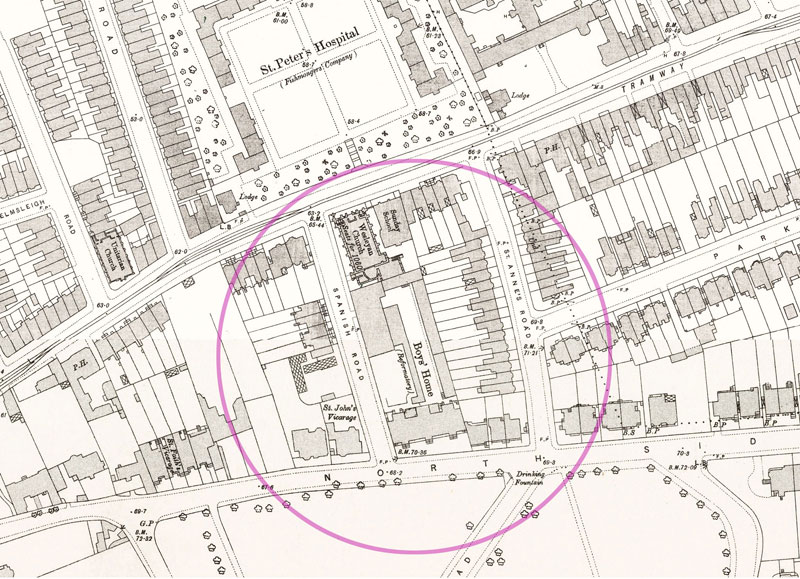
[For a similar dinner the previous year, see Chronicles: December 2021. For a fire at the Reformatory in 1870, see Chronicles: April 2023.]
As late as 1890, Wandsworth Common could be described as a "most bracing country situation", and hence a healthy environment for young people, especially the "young, delicate, or backward". Significantly, pupils were mainly sought in "India, China and the Colonies" — i.e. the children of ex-pats:

CHEERFUL refined HOME-SCHOOL
LIFE in a most bracing country situation, with the best educational advantage, and facilities for in and out door recreations, thus ensuring good health and steady progress to young, delicate, or backward BOYS.
Indian and Colonial pupils remain during holidays pro rata. — Dr Blackburn, M.A., B.Sc. The Beeches, Wandsworth common, Surrey.
[BNA: Link]
"The Beeches", originally the home of the Wilson family, was situated on the corner of Routh Road and Trinity Road. It was demolished (in the 1970s?) and a small block of flats built on the site.
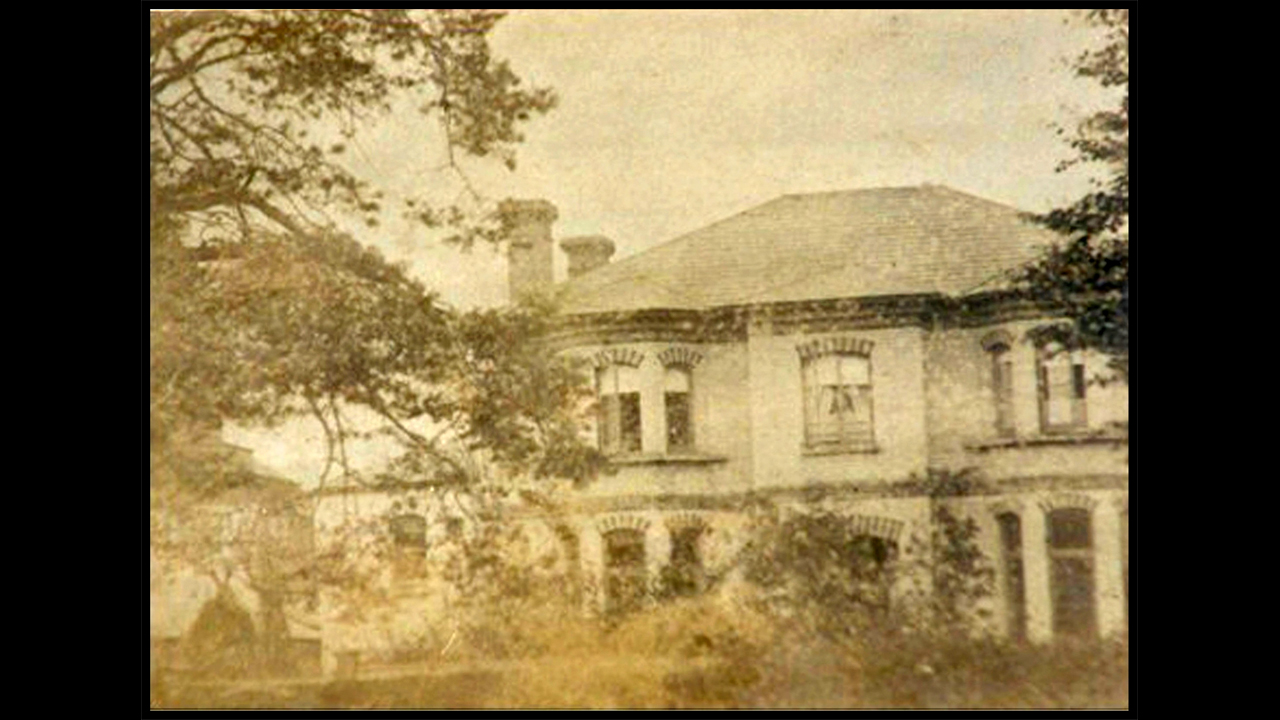
Poisoned Lovers on Wandsworth Common . . .
A LOVE TRAGEDY.
Tried to Die Together.
At the South Western Police Court, London, today, Alice Allen, 16, was charged with attempting to commit suicide. It is alleged that the accused and her lover, George Bastow, resolved to die together, as the girl’s parents wore opposed to their marriage. Providing themselves with bottle of liquid poison they went to Wandsworth Common, and drank its contents. They were found by the police very ill, and were taken to a hospital, where Bastow is still lying in a dangerous condition. The girl was remanded.
[BNA: Link]
"Alice Allen, a good-looking girl of 16, living in the Stockwell-road, London has parents who oppose her marriage with a youth named George Bastow. For this reason she and her lover resolved to die together . . . "

POISONED LOVERS.
STRANGE STORY OF ATTEMPTED SUICIDE.
Alice Allen, a good-looking girl of 16, living in the Stockwell-road, London, has parents who oppose her marriage with a youth named George Bastow.
For this reason she and her lover resolved to die together.
Providing themselves with a bottle, labelled "Spirits of Salts — Poison," they made their way to Wandsworth Common, where, sitting on seat, they shared the contents.
A policeman found them there on the night of January 1st, ill and half-unconscious. With assistance, he carried them to the Bolingbroke Hospital, where the young man is still lying in dangerous condition.
The girl, who had admitted that they tried poison themselves, was brought up yesterday, at the South-Western Police court.
Mr. De Grey, however, was unable to extract any information from her, and suggested, as he remanded the case, that Miss Reade, the lady missionary, should speak to her.
[BNA: Link.]
THE COURSE OF TRUE LOVE
Alice Allen (16), bottle-wirer, of 11a, Stockwell-road, was charged on a warrant with "unlawfully attempting feloniously of her malice aforethought to kill and murder herself."
>P.C. I9SY said that at 9 30 in the evening of New Year's Day he was called to Wandsworth Common and found prisoner and a young man named William Bastow sitting on a seat. Both were in greet pain.
The girl said, "We've taken some poison." A bottle marked "Spirits of Salts — Poison "was lying on the ground near. Both were taken to Bolingbroke Hospital.
At the hospital the girl said "We took it as my parents were not willing for me to go with William Bastow."
He arrested her on her discharge from the hospital this morning. — Dr. Hughes, medical superintendent at the hospital, said the man would not be discharged before the end of this week." — Prisoner was remanded.
[BNA: Link]
I wonder what happened to them both?
There has to be a General Election in the coming year-and-a-month, and perhaps very soon. Here's a story from an election just before WWI . . .
The Liberal candidate, Walter Richard Warren, was up against the Conservative incumbent, Henry Kimber. Warren's HQ was David Lloyd George's former home on Routh Road (in the area now called the Toast Rack but then known as College Park).
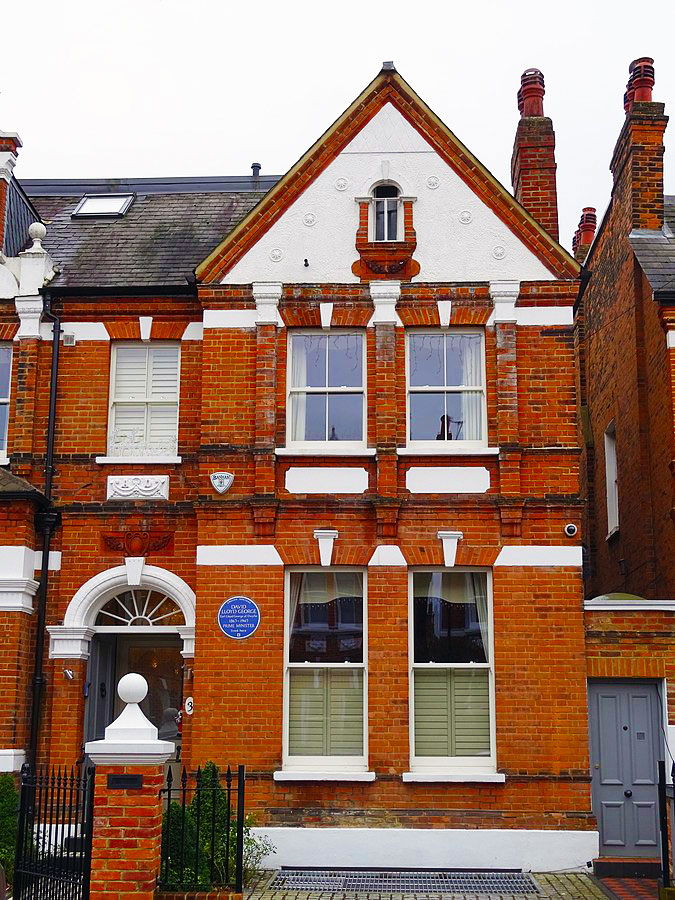
Mr. Lloyd-George's Old House in the Election.
The house in which Mr. Lloyd-George formerly resided at Wandsworth Common is bound up with Liberal traditions to such an extent that the present occupier has decorated the roof with a huge poster enjoining the neighbours to "Vote for Warren," the Liberal candidate for Wandsworth.
The place has, indeed, become for the nonce a glorified posting station, election literature creeping up from the garden fence to the chimney pots, and the main poster can be read a mile away.
But Liberals are few and far between in that part of London, which has been represented by Sir Henry Kimber for quarter of a century.
[BNA: Link]
The newspaper's prediction was not wrong.

There were numerous theatres and music halls in late-Victorian and Edwardian Battersea and Wandsworth. Whenever a theatre show was coming to the end of its run, particularly if audience numbers were in decline, it was common to offer cheap or free seats for worthy causes, as here. The proprietors, "anxious for the happiness of the poor" distributed tickets to "workhouse inmates, the Patriotic School, Wandsworth Common, and other institutions of like class":

Although the pantomime at the Shakespeare is drawing crowded audiences, the management announce, with much regret, the last 18 performances — 19 nights and six matinees — of "Little Red Riding Hood."
This week some new songs, gags, and wheezes are promised.
Messrs. Bennett and Bennett, anxious for the happiness of the poor in their own immediate district, hove sent invitations to the workhouse inmates, the Patriotic School, Wandsworth Common, and other institutions of like class.
[BNA: Link]
[Arthur Lloyd: Link]
I was looking for more info. about Red Riding Hood and the Shakespeare Theatre, when by chance I noticed that last year's panto at the Battersea Arts Centre on Lavender Hill was, er, Little Riding Hood. The Shakespeare was next door to the Town Hall, as you can see in this image:

There's been rather a lot of grim reading in this month's Chronicles. It didn't start that way, but that's how it developed. Partly to compensate, here's an upbeat item on some loveable creatures who the world may have learned to call the Wombles of Wandsworth Common, but for some reason it doesn't.
The first Wombles book came out in 1968, and the first TV programme in 1973, fifty years ago. (New audio versions of the Wombles books, narrated by Richard E. Grant, have just become available on BBC iPlayer.)
The Wombles were great litter-pickers, and this furry family did a lot to promote the activity (so important to us all during and since Lockdown).

I had a quick look round and was intrigued by a reference in this interview to author Elisabeth Beresford's "lovely white house on the edge of Wandsworth Common". So not Wimbledon but Wandsworth. But where?
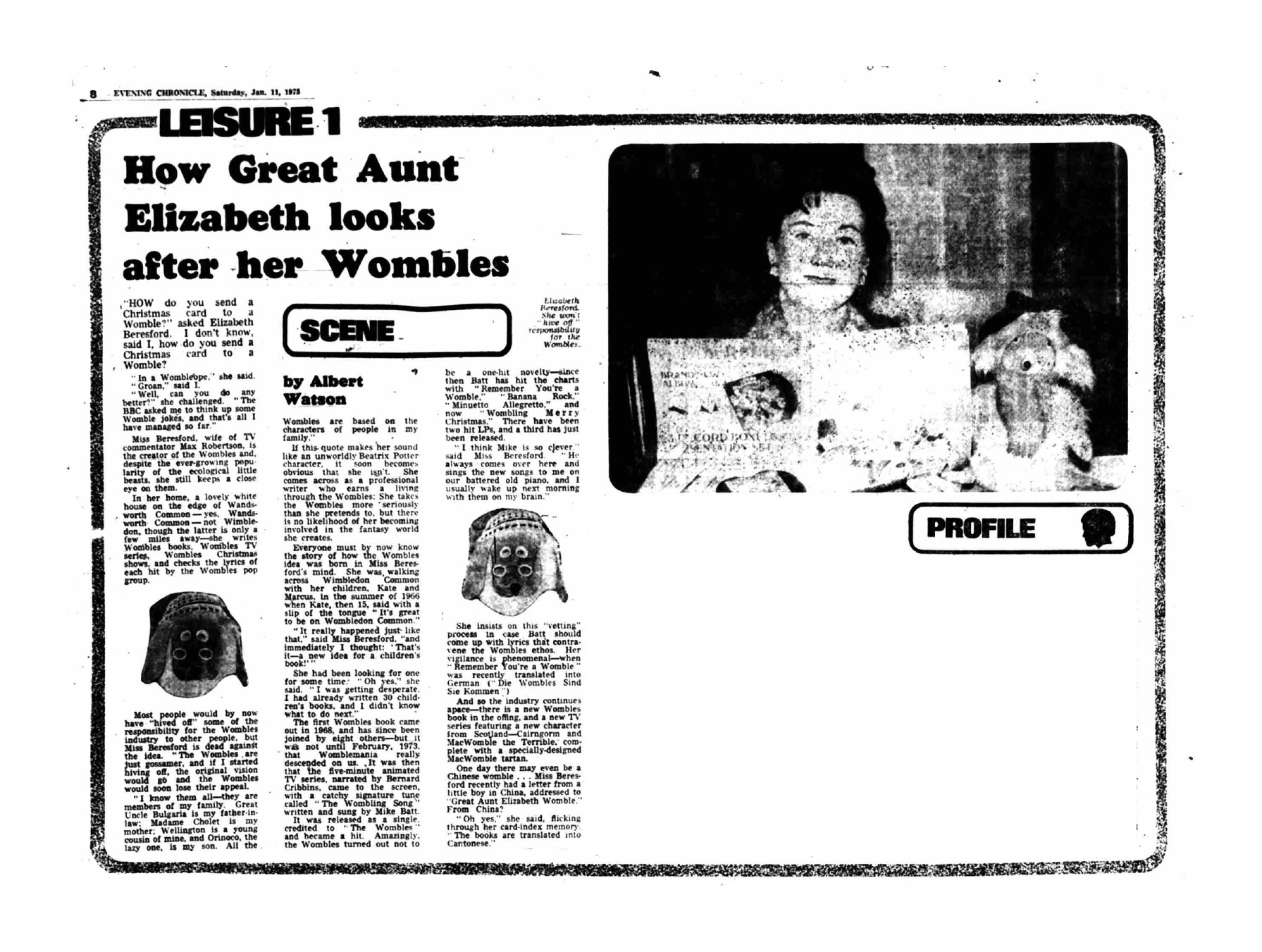
How Great Aunt Elizabeth looks after her Wombles
by Albert Watson
"HOW do you send a Christmas card to a Womble?" asked Elizabeth Beresford. I don't know, said I, how do you send a Christmas card to a Womble?
"In a Wombleope," she said.
"Groan," said I.
"Well, can you do any better?" she challenged. "The BBC asked me to think up some Womble jokes, and that's all I have managed so far."
Miss Beresford, wife of TV commentator Max Robertson, is the creator of the Wombles and, despite the ever-growing popularity of the ecological little beasts, she still keeps a close eye on them.
In her home, lovely white house on the edge of Wandsworth Common — yes. Wandsworth Common not Wimbledon Common, though the latter is only a few miles away — she writes Wombles books, Wombles TV series, Wombles Christmas shows, and checks the lyrics of each hit by the Wombles pop group.
Most people would by now have "hived off" some of the responsibility for the Wombles industry to other people, but Miss Beresford is dead against the idea. "The Wombles are just gossamer, and if I started hiving off, the original vision would go and the Wombles would soon lose their appeal.
"I know them all — they are members of my family. Great Uncle Bulgaria is my father-in-law; Madame Cholet is my mother; Wellington is a young cousin of mine, and Orinoco, the lazy one, is my son. All the Wombles are based on the characters of people in my family."
If this quote makes her sound like an unworldly Beatrix Potter character, it soon becomes obvious that she isn't. She comes across as a professional writer who earns a living through the Wombles: she takes the Wombles more seriously than she pretends to, but there is no likelihood of her becoming involved in the fantasy world she creates.
Everyone must by now know the story of how the Wombles idea was born in Miss Beresford's mind. She was walking across Wimbledon Common with her children, Kate and Marcus, in the summer of 1966 when Kate, then 15, said with a slip of the tongue "It's great to be on Wombledon Common."
"It really happened just like that," said Miss Beresford, "and immediately I thought: 'That's it — a new idea for a children's book!'"
She had been looking for one for some time. "Oh yes?' she said. "I was getting desperate. I had already written 30 children's books, and I didn't know what to do next"
The first Wombles book came out in 1968, and has since been joined by eight others — but it was not until February, 1973. that Womblemania really descended on us. It was then that the five-minute animated TV series, narrated by Bernard Cribbins, came to the screen, with a catchy signature tune called "The Wombling Song" written and sung by Mike Batt.
It was released as a single, credited to "The Wombles" and became a hit. Amazingly, the Wombles turned out not to be a one-hit novelty — since then Batt has hit the charts with "Remember You're a Womble," "Banana Rock," "Minuetto Allegretto," and now "Wombling Marry Christmas." There have been two hit LPs, and a third has just been released.
"I think Mike is so clever." said Miss Berestord. He always comes over here and sings the new songs to me on our battered old piano, and I usually wake up next morning with them on my brain."
She insists on this "vetting" process in case Batt should come up with lyrics thit contravene the Wombles ethos. Her vigilance is phenomenal — when Remember You're a Womble" was recently translated nto German (" Die Wombles Sind Sie Kommen")
[PB: something seems to be missing here in the original article — an example of a proof-reader whose vigilance is less than phenomenal?]
And so the industry continues apace — there is a new Wombles book in the offing, and a new TV series featuring a new character from Scotland — Cairngorm and MacWomble the Terrible, complete with a specially-designed MacWomble tartan.
One day there may even be a Chinese womble. Miss Beresford recently had a letter from a little boy in China, addressed to — Great Aunt Elizabeth Womble." From China?"
"Oh yes," she said, flicking through her card-index memory. The books are translated into Cantonese.
BNA: Link

March 2024: Fred Pearce emailed:
However, the Wombles (or their costumes anyhow) were MADE adjacent to Wandsworth Common. As a teenager, my wife worked overnight to finish them for a stage production at the height of the fad with her mother, a theatrical costumier who lived and had her workshop on St James's Drive...
Sorry, no pics. They were too busy sewing...
Thanks, Fred!
In the absence of actual Wombles on Wandsworth Common dealing with all the rubbish strewn around during Lockdown, I bought a couple of Litter-Picker-Pro's — excellent fun for all the family.

SO many more stories still to tell. But that's all for now, folks.
If you would like to receive occasional notifications of new Chronicles, let me know.
This search box is not very consistent, but always worth a try:
Send me an email if you enjoyed this post, or want to comment on something you've seen or read on the site, or would like to know more —or just want to be kept in touch.
January 2024
Return to the top of this page . . .